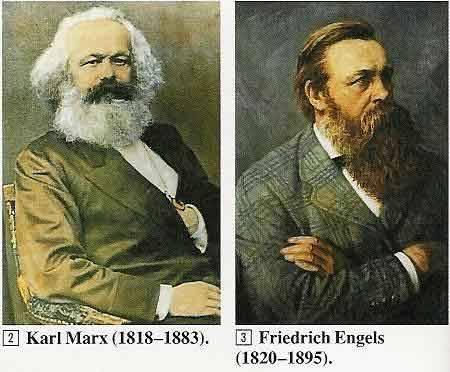
By Rudolf Steiner

From
the German magazine
The Threefold Social Organism (1919)
It is impossible to be free of the social chaos in which Europe is mired if certain long-standing social demands are made with a distorting lack of clarity.
Such a demand, one that prevails in many circles, is contained in Friedrich Engel's book The Evolution of Socialism from Utopia to Science, in which he writes: “Instead of controlling people, controlling products and production processes must prevail.”
Many proletarian leaders, as well as the proletarian masses, adhere to this viewpoint. In a certain sense it is correct. The human relations which have developed in modern states have formed administrative bodies that not only control products and production processes, but also the people engaged in these processes. Economics consists of the management of products and the various production processes. In modern times, this has taken on forms which make it necessary that this management no longer includes controlling people as well.
Marx and Engels realized this. They directed their attention to how both capital and human labor are active in economic processes. They felt that modern humanity is striving to go beyond the way the system is organized, for it creates the means for capital to exert power over human labor. It not only serves to manage and control products and production, it also provides the excuse for controlling people. From this Marx and Engels concluded that controlling people must be excluded from the economic processes. They were right. For modern life does not permit that human beings be treated as mere appendages of objects and production processes, and that they be included in the control of same.
Marx and Engels believed, however, that the matter could be resolved by simply excluding the control of human beings from the economic process and leaving only a newly purified management organized by the state. They did not realize that in the old way there is something that organizes relations between people, which cannot be left unorganized. They will not simply organize themselves if detached from the old way.
Nor did they see that the source for the organization and control of products and branches of production is found in capital. Through the detour of capital the human spirit manages the economy. By managing goods and production, however, one does not nurture the human spirit, which always creates anew and which must provide new forces to the economy if it is not to ossify and eventually crumble.
What Marx and Engels saw was correct: that control of the economy should not include the control over men, and that capital, which serves the economy, should not acquire power over the human spirit which it needs to show it the way. But their fateful error was to believe that both human relations and the management of the economy by the human spirit would somehow continue when they are no longer administered by the economy itself.
The purging of the economy, that is, limiting it to the management of products and production processes, is only possible if accompanied by something that takes the place of the old system of control, and something else which enables the human spirit to be the real leader of the economic process. This role is provided by the concept of the threefold social organism.
An independent cultural/spiritual organization will supply the economy with the spiritual forces it needs if it limits itself to the management and control of goods and production processes. And the rights sector of the social organism [the political state], when separated from the cultural and economic spheres, will be able to democratically govern human relations in such a way that no individual, through capacities or economic influence, will have power over others.
Marx and Engels's viewpoint in respect to the demand for a reformation of economic life was correct, but one-sided. They didn't see that economic life can only be free if an independent rights sector and an independent cultural sphere are placed alongside it. Which form economic life must take in the future can only be seen when we are clear that the capitalistic-economic orientation in which economic power controls human relations must be replaced by a spiritual one. The demand for an economy that is only occupied by producing goods can never be realized alone. Whoever advocates this wants to create an economy which has thrown off what was necessary for its existence and expects it to continue to exist without it.
Under different living conditions, but from profound experience, Goethe wrote two things which are applicable to many social demands of our times. The first is: “A deficient truth works for a while; instead of complete illumination though, a blinding falsehood suddenly enters; the world is satisfied and centuries are deceived.”
The second is: “Generalizations and extreme arrogance are the path to terrible harm.” Truthfully Marxism, having learned nothing from the conditions of our times, is a deficient truth which, despite this, has an effect on the proletarian worldview. But after the catastrophic [First] World War, instead of being applicable to the true demands of the times it has become a blinding falsehood, which must be prevented from deceiving centuries. The wish to prevent it is the inclination of those who recognize the harm that the proletariat is rushing into because of this deficient truth, from which have arisen generalizations, the arrogant supporters of which reject as Utopian everything that is trying to replace their truly Utopian generalizations with the realities of life.
Loosely translated by Frank Thomas Smith
The treatment of people to be controlled as objects in the economic process was confirmed in the early sixties by the Friedman oriented “Chicago school” which defined the “labor market” in which human labor is bought and sold as though it were an object, a modified form of slavery. (Ed.]
Home